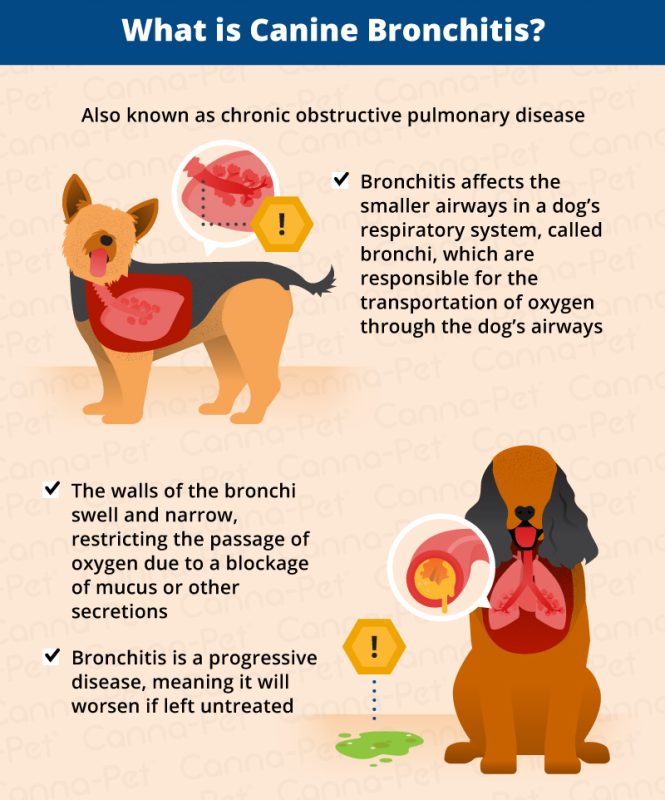
ជំងឺរលាកទងសួតនៅក្នុងសត្វឆ្កែ: រោគសញ្ញានិងការព្យាបាល
When breathing, air enters the body through the mouth or nose and passes through the trachea, also called the windpipe. The air then enters smaller airways called bronchi, then even smaller bronchioles, and finally tiny alveoli, through which oxygen enters the bloodstream.
Bronchitis in dogs is a common disease that affects the upper respiratory tract and causes coughing. If the cough lasts more than two months, bronchitis is usually called chronic.
មាតិកា
តើជំងឺរលាកទងសួតគឺជាអ្វី?
During bronchitis, the bronchi and bronchioles become inflamed, that is, those parts of the lungs through which oxygenated air passes. Inflammation of these airways leads to mucus production, coughing and irritation, which in turn stimulates more mucus production, creating a continuous cycle of inflammation.
Infectious tracheobronchitis is an indirect disease that affects the trachea, bronchi, and bronchioles. It is more commonly associated with acute illnesses such as kennel cough. Chronic bronchitis, in contrast, usually does not affect the trachea.
These disorders may have the same manifestations but different causes and treatments, so it is important to distinguish between them. A veterinarian can help diagnose.
Symptoms of bronchitis in dogs
Animals with bronchitis may have a wet, dry, or hoarse cough. Sometimes dog owners confuse coughing with burping or gagging, so making a short video for the veterinarian is helpful.
Even if a pet’s cough seems minor, it may indicate a problem. If it becomes permanent, the dog should be taken to the veterinarian. This is especially important if the nature of the cough changes – it occurs more often, becomes louder or softer, wetter or drier.

មូលហេតុនៃជំងឺរលាកទងសួតនៅក្នុងសត្វឆ្កែ
Bronchitis in dogs can be caused by factors that irritate the airways or otherwise stimulate an inflammatory response. The most important thing is to distinguish it from other causes of cough, including:
- bacterial or viral tracheobronchitis, also called canine cough;
- ការរលាកសួត;
- tracheal collapse;
- fungal infections of the lungs;
- parasites, such as lung and heartworms;
- មហារីក;
- ជំងឺខ្សោយបេះដូង
- foreign bodies.
In many cases, these disorders can exacerbate the course of chronic bronchitis in dogs. However, the true cause of the disease is an inflammatory cycle that is initiated and maintained by the reactivity of the animal’s airways.
Asthma is distinct from chronic bronchitis and is rare in dogs. The veterinarian will explain in detail each of these problems in relation to a particular case.
Chronic Bronchitis in Dogs: Diagnosis
Veterinarians diagnose chronic disease based on many different factors, including history and examination findings. To help diagnose and rule out other causes of cough, the following tests are done:
- កាំរស្មីអ៊ិច។ In many dogs, signs of chronic bronchitis are clearly visible on x-rays.
- ការឆ្លុះទងសួត។ Examination of the condition of the bronchial mucosa through a bronchoscope allows you to clearly see the clinical picture of bronchitis. Bronchoscopy provides direct visualization of the airways, but can be expensive and difficult for many patients, especially small pets. The dog will need general anesthesia. In addition, this procedure in most cases must be carried out in a specialized hospital.
- bronchoalveolar lavage. This procedure, also called bronchial lavage, involves evaluating mucus and cell samples using microscopy, culture, and susceptibility testing. It can help in making a definitive diagnosis. The procedure requires preliminary administration of drugs and general anesthesia.
- តេស្តឈាម។ While testing alone does not provide a definitive diagnosis, it can help rule out other causes and complications.
Bronchitis in dogs: treatment
Most cases of canine acute bronchitis are successfully treated, with the ultimate goal being to break the cycle of mucus production and inflammation. Your veterinarian will likely recommend one or more of the following options:
- oral medications, including anti-inflammatory corticosteroids such as prednisone, airway dilators, and mucolytic drugs designed to thin mucus and secretions;
- cough medicines;
- antibiotics in the presence of secondary infections;
- nebulization (delivery of a drug sprayed into the respiratory tract) and blending (a method of removing fluid from the chest by intermittent tapping on the ribs) to moisten the respiratory tract and remove mucus.
An inhaler can also be used to deliver variations of these drugs. It allows you to reduce side effects by delivering the drug directly to the respiratory tract.
In addition, dogs with bronchitis are often advised to lose weight. The extra pressure on your airways from being overweight can exacerbate the vicious cycle of inflammation and mucus buildup.
Bronchitis in a dog: prevention
Bronchitis most commonly affects small, middle-aged and older dogs, but all breeds are potentially at risk. Although doctors believe that dog airway reactivity is genetic, environmental factors also play a role.
Maintaining a healthy pet weight is of high importance in the prevention of bronchitis. Reducing airway pressure helps the animal fight disease better.
Cigarette smoke, diffuse essential oils, household cleaners, paint fumes, and construction dust are considered potential irritants. It is advisable to keep the dog away from them, especially if he has already been diagnosed with chronic bronchitis.
Dogs living in regions where pollen or smoke is common at certain times of the year may be at higher risk of the disease, as bronchitis is considered a seasonal ailment. A sudden change in weather conditions can also aggravate symptoms. In any case, during the period of pronounced manifestation of symptoms of the disease, it is better not to let the pet go outside at all.
សូមមើលផងដែរ:
- ការជ្រើសរើសពេទ្យសត្វ
- សញ្ញានៃភាពចាស់នៃខួរក្បាលនៅក្នុងសត្វឆ្កែ និងការព្យាបាល
- ជំងឺឆ្កែឆ្កួតទូទៅបំផុត: រោគសញ្ញានិងការព្យាបាល
- ជំងឺនៃកូនឆ្កែ: រោគសញ្ញានៃជំងឺ canine distemper និង parvovirus enteritis





